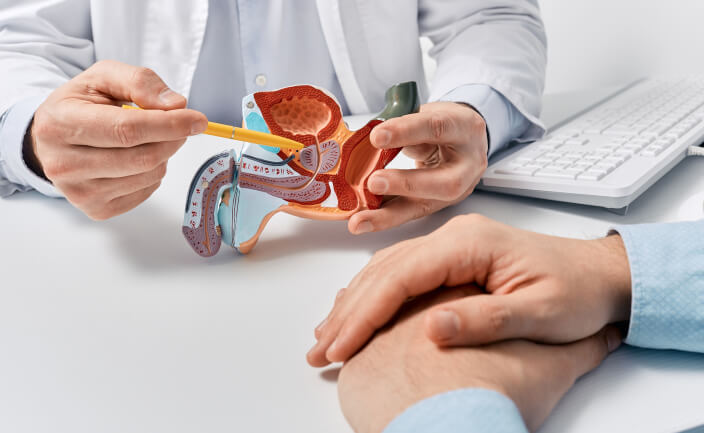What Is Prostate Cancer?
Prostate cancer is a disease which develops when the cells in the prostate gland begin to grow and divide uncontrollably, leading to the formation of a tumour. While most cases of prostate cancer progress slowly and remain confined to the prostate, they may spread to other parts of the body.
Prostate cancer is the third most common type of cancer in Singaporean men and usually occurs in men over 50 years old.
Do I Have Prostate Cancer?
As prostate cancer is a prevalent condition that affects many individuals, it is essential to be well-informed about the risk factors and symptoms associated with prostate cancer to promote early detection and timely intervention.
What Are the Risk Factors for Prostate Cancer?
While the precise reason for prostate cells turning cancerous is not understood, several factors may put you at a higher risk of prostate cancer.
Family history
- Individuals with a first-degree relative (brother or father) are at higher risk than others, with an even greater risk if more than one relative is affected.Age
- The risk of prostate cancer increases with age, especially after the age of 50, and most commonly so for those aged 60-70.Genetics
- Prostate cancer tends to be more common in Africans and rarer in Asians.Diet
- Studies suggest a link between having a diet high in saturated fat, well-done meats, and calcium and an increased risk of prostate cancer.
What Are the Symptoms of Prostate Cancer?
During its early stages, prostate cancer often develops without noticeable symptoms. Since many prostate cancers progress slowly, many men do not know about it and it is usually detected incidentally during a routine screening. However, when symptoms do occur, you should keep a lookout for these symptoms below and seek medical attention from a urologist immediately:
- A frequent need to urinate at night
- Difficulty urinating
- Blood in the semen or urine
- Stiffness or pain in the thighs, lower back and hips
- Erectile dysfunction
How is Prostate Cancer Diagnosed?
Various tests can be used to diagnose prostate cancer, including:
What is a Prostate Biopsy?
A prostate biopsy is a procedure to remove and analyse tissue samples from the prostate gland, providing a definitive confirmation of the presence or absence of prostate cancer. This can be accomplished by inserting a needle either through the rectal wall (transrectal) or the skin between the anus and scrotum (transperineal). Due to the potential for serious infections from transrectal prostate biopsies, it is advised that where available, transperineal prostate biopsies are done when necessary.
- Safer & Sterile - Minimal risk of infection as the needle avoids contact with faecal content
- Better Access - Easier sampling from hard-to-reach areas of the prostate
- No Antibiotics - This avoids the possibility of bacteria building up antibiotic resistance
- More Comfortable - No needle punctures of the sensitive rectum, avoiding rectal bleeding
- Smoother Process - Hospitalisation and general anaesthesia are not required
- More Precise - Real-time ultrasound and MRI scans accurately guide your urologist
Consult a urologist for relief of these discomforts.
What Are My Treatment Options for Prostate Cancer?
There are many ways to treat prostate cancer, and the best treatment for you will depend on several, including the stage and grade of your cancer, your age, overall health, and personal preferences.
There are two primary types of radiotherapy for prostate cancer: external beam radiotherapy, which is administered from outside the body, and brachytherapy, which involves inserting radioactive seeds or needles into the prostate.
When determining what one's prostate cancer treatment will entail, it is valuable to seek multiple consultations and second opinions from specialists. These steps will help you thoroughly explore your options and make an informed decision.
is Our Priority

Location
6 Napier Road #05-03,
Gleneagles Medical Centre,
258499, Singapore
Contact Us
| Phone |
: +65 6732 6503 |
| : info@tanurology.com.sg |
